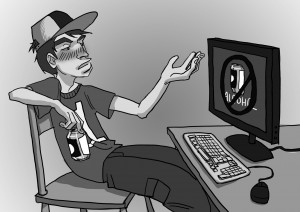New AlcoholEdu doesn’t ignore students’ needs
Not all college students are created equal.
Some of us don’t drink. Some of us were exposed to alcohol before college and some of us weren’t. Most of us, regardless of what we might tell our parents, coaches, doctors or that aunt we like to borrow money from, have consumed alcohol more than a few times in our past. And some of the latter group have a history of substance abuse.
In June, USC brought on board the AlcoholEdu for Sanctions program, in essence an alcohol awareness program that has been improved and tailored specifically to university students, especially those who have struggled with alcohol-related problems.
AlcoholEdu has garnered a reputation among some students as ineffective or a waste of time. According to a 2007 AlcoholEdu summary of key findings at USC, 54 percent of student drinkers felt they didn’t need to make any changes to their drinking habits after completing the course.
So at first glance, it might seem counterproductive to counsel students with negative drinking histories over the Internet. Don’t these students deserve personal interaction, not the equivalent of an online traffic court?
Time for a second glance.
USC’s Health Promotion and Prevention Services didn’t scrap the idea of counseling and outreach in favor of a standardized online course. What it did was divide the students referred to the department into two groups.
The first group consists of those who are unfortunate enough to find themselves in a room with both an open container of alcohol and a member of the Department of Public Safety. These are those wide-eyed students who can later be found earnestly explaining to their resident adviser, “Oh, see, I was just in a room hanging out with some people and my friends were drinking. I wasn’t.“ This group is the one sternly directed to the online AlcoholEdu for Sanctions course.
The second group, those who have in the past demonstrated harmful behavior or had negative experiences because of alcohol, are required to complete the course and still meet with a member of HPPS. HPPS, while not responsible for counseling them personally, helps them locate the appropriate resources, whether on or off campus, for therapy and learning how to make healthier decisions with alcohol in the future.
“Our goal is to increase protective behaviors while decreasing high-risk behaviors” said Paula Swinford, director of HPPS at the University Park Health Center. “We feel that AlcoholEdu for Sanctions really is the best choice for students at USC.”
AlcoholEdu for Sanctions has in reality done more than just institute new alcohol awareness courses and keep its one-on-one meetings going strong. The online aspect also standardizes the consequences for underage drinking among the “that’s not my cup” students. In the past, the severity of punishment for underage drinking was contingent upon whether the student was caught by an R.A. in the dorms, a DPS officer on The Row or a sanctions officer in a fraternity house. The advent of the new online course recognizes that those offenses are usually alike, and gives a consequence that is universal.
“It’s a fairer system now,” Swinford said.
In addition, HPPS is incorporating MentalHealthEdu and SexualAssaultEdu, both of which use data gathered from USC students in past years to tailor the courses specifically to our student body.
HPPS can’t say what percentage of sanctioned students will simply need the online course or will require additional resources. After all, the program is in its first year. What we do know is that the professionals involved are by no means giving up on personally meeting with sanctioned students — and that AlcoholEdu for Sanctions is a constructive step forward in the drive toward alcohol awareness.
Kastalia Medrano is a sophomore majoring in print journalism.

